Life lessons from Uncle Lizardman
Published in Nuda:Ego
What defines a human being? Back in his late teens, Erik Sprague was just another young philosophy major tackling that eternal question. His particular method of investigation, however, would turn out all the more unique, developing into a life-long art project as well as granting him a career as one of the world’s foremost freak show acts. Using various means of extreme permanent body modification – full-body tattoos, sharpened teeth, a split tongue, etc – Erik Sprague has now spent the majority of his life as Lizardman. After appearances on the Ripley’s Believe It or Not! TV series skyrocketed him into superstar status, Lizardman has toured the world – swallowing swords, breathing fire and performing flesh hook suspension acts for awestruck crowds. Calling in from the Austin, Texas home he shares with his wife and pet ferrets, Lizardman spoke to Professor of Practical Philosophy Gustaf Arrhenius about transference, fame, and how cutting of your own arm might be the path to mind-body harmony.
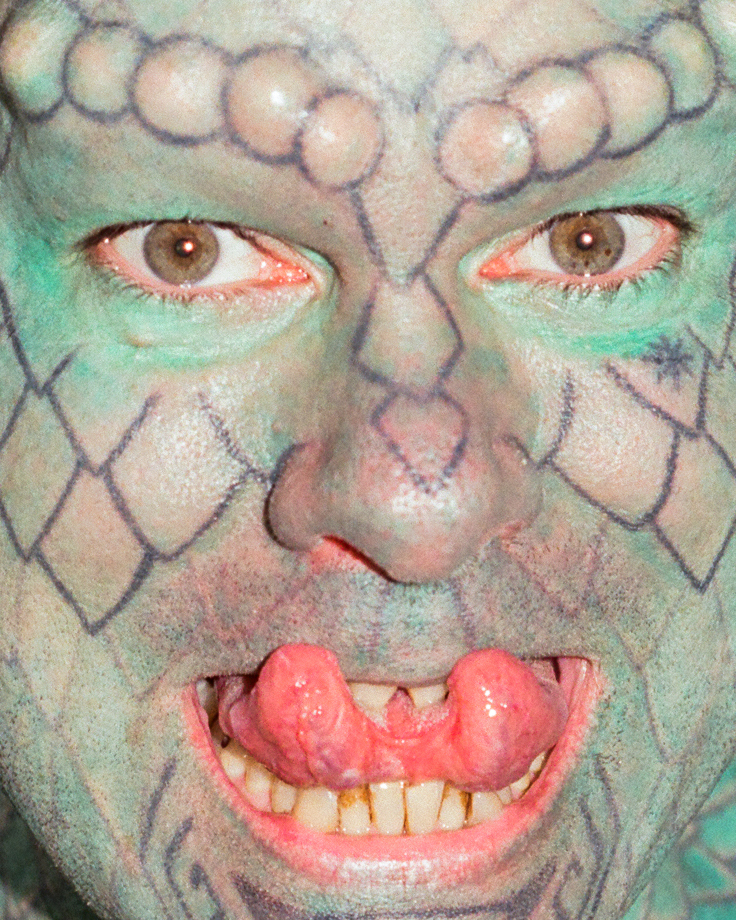
Gustaf: Why did you become Lizardman?
Lizardman: When I was about 18 years old I started pursuing this idea of what it meant to be human, to be perceived as human, to have that term applied to you. I was coming at it from the standpoint of philosophy of language.
I was a philosophy major but also doing independent studies in performance art and conceptual art, and I had this pet idea that I could never get away from, all my work always drove me back to it: What’s the definition of a human being? Someone would give me a biological definition and I’d be like, well, you’ve never taken a DNA sample in your life, so you don’t know if you’re living in a world of aliens. You don’t know if you’re human.
That was my thing that I climbed through as an undergrad. I kept going back to it and chewing at it and it fed into this conceptual art project idea: If I stopped behaving human and stopped looking human, would they have to expand the definition to include me? Or would they just say screw it, you’re not human anymore?
I have “freak” tattooed on my chest. I feel like I’ve earned it.
Gustaf: That’s something about how other people try to classify you as something. Then there’s this other aspect, whether this is in any way connected to your own identity or not? People who are born with, let’s say, a male body don’t necessarily perceive themselves as male, so they feel that by changing sex they’re transforming towards what they really are. Can you relate to that or is it Lizardman about something else?
Lizardman: You know, on the surface there seems to be a lot of overlap between what I do and that kind of transition. I have lots of experience of transference coming from a body modification standpoint, but I always try to make clear how that is not my journey. That is not my thing. That is not my statement. I have chosen to be an artist who entertains. I do find it interesting to play with ideas of transference, hopefully getting audiences thinking about these things. I know from experiences of people coming up to talk after a show, that if the idea of trans anything – whether it be transhumanism or transsexuality – if that blows your mind, then I’m kind of a gateway, an easy way of looking at it. It’s not something I push but I like to know that it’s subversively there.
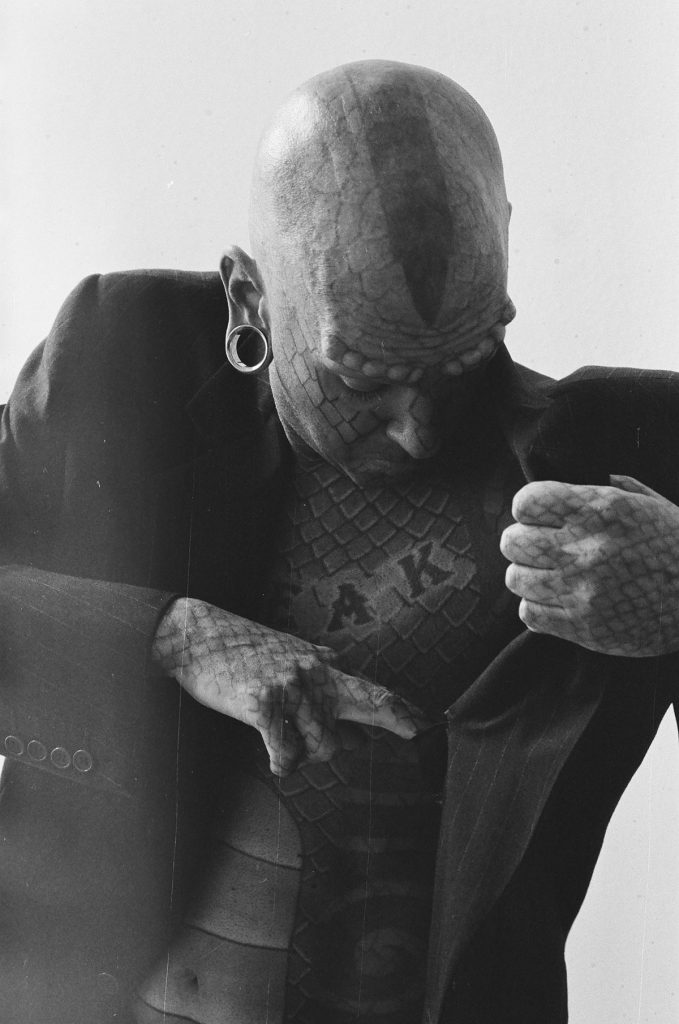
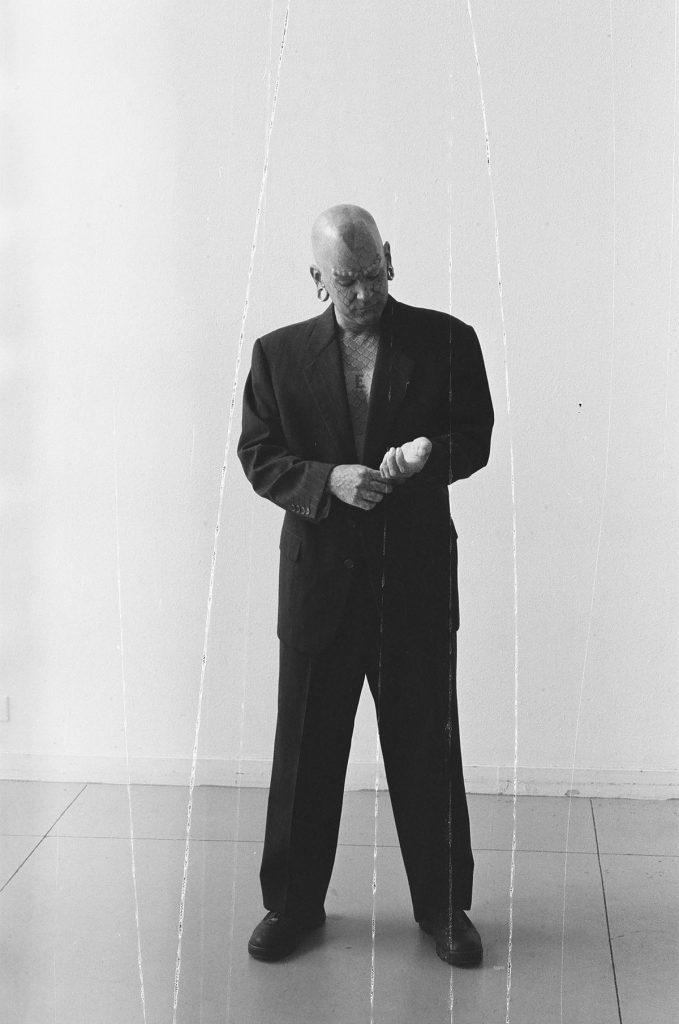
Gustaf: What were the first steps you took in becoming Lizardman?
Lizardman: Very early on in the project, when I was about 18 or 19, freshman or sophomore in college, I had devoted a sketchbook to this idea of using body modification to transform myself. There was this philosophical element that I was feeding into it, but I was also getting fascinated with sideshow performers and I learned about people who had made careers out of being heavily tattooed, or pierced weightlifters – you know, people who were doing that body-based stuff.
I was looking at a lot of 70s performance artists, like Karlie Snyman, Video Conchie, and Chris Burton. Those people were just right in my face at that time, when I was thinking a lot and pulling all that together. So, before the lizard, I experimented with ideas like doing polka dots, or going for a demonic approach, or a skeletal theme. But these things had been done many times, so they wouldn’t have been good career choices. It was better to do something that was a little more unseen, at least in terms of permanent body modification. Eventually, the reptilian motif just worked well with a lot of the different things I wanted to do. I just felt like I wanted sharp teeth. I wanted a forked tongue, that was a real goal.
Gustaf: In what ways has the way you look now changed how people perceive you?
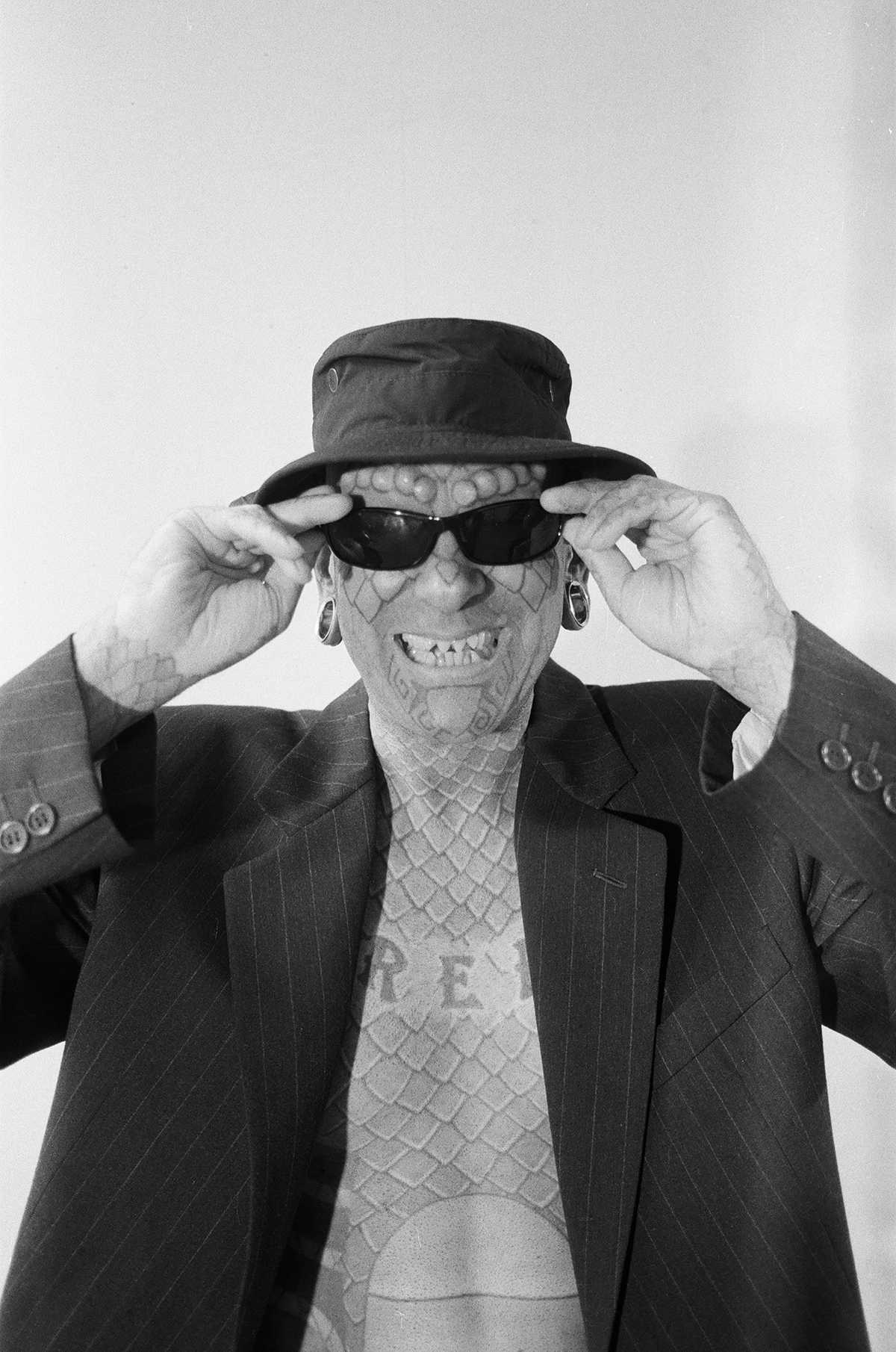
Lizardman: You’re always communicating something about yourself to the world, right? It’s the way a lot of us define ourselves to the world, by picking out what we wear, picking out how we style our hair. You do something to your body and it lets people know you’re a punk rocker, or a doctor, or lawyer, a professional or someone that doesn’t care for your society. We send a lot of messages about who we think we are.
For me however, the biggest difference was… My life looks like this: Before I was on TV and after I was on TV. That changed people’s opinions, it changed reactions and situations. You know, it was like a story of over-night success from a sitcom or a movie. Once I was on TV I had passed a pop culture threshold where I was no longer that guy who mutilated his face and body – I was that guy from the TV show. It was like “hey, I saw you on Ripley’s, come over here to my restaurant”. “Hey, you were on Ripley’s, please take a picture with me. Let me buy you a drink”. Whereas before it was like “what’s wrong with that guy? Why did he do that?”.
I also know a guy who voluntarily amputated his own hand, and if you meet him, he’s boring!
Gustaf: So far we’ve only mentioned looks but have you also included behavioural aspects in the project. Have you also looked at how lizards behave or is that not part of it?
Lizardman: Early on, that was a much bigger part of it, especially when I was still in school, still an undergrad. I was doing a lot of happenings, like concept art things and at that point I wasn’t modified and didn’t look like this, but I was costuming myself, often in weird ways, like I covered myself in trash from the registrar’s office one time, kind of hulked around campus, stuff like that, I once ran a dead rabbit up the flagpole on Easter Sunday. Let’s see… I smashed zucchini on the steps leading to the cafeteria, with “these vegetables died for your sins” written on the stairs, then I’d be observing from the bushes. It was a lot of fun at the time. So, the beginning was changing my appearance but also not behaving human, trying to get people wondering. I’m a big lover of hoaxes too, like the original Bigfoot stuff and Loch Ness, it also tied into that. I wanted to get people to believe in those things, or just open up their minds to that idea of something wild. Like, I don’t necessarily want you to think there’s a monster on campus, I want you to entertain your imagination with the idea. That was always one of the goals and then ultimately it was like, yeah, I’m going to become the thing myself, permanently.
Gustaf: You mentioned transhumanism earlier. What in your opinion is the difference between body modification and what might be called human enhancement, where you make yourself stronger or more beautiful, things like that?
Lizardman: I think there’s an idea that modification is only enhancing to someone if it has a clear benefit, right? I wish I could say that filing my teeth made eating better than before, though it made no tangible difference, it’s purely aesthetic. There are actual benefits to having a split tongue though, with almost no drawbacks, because you don’t know about it unless I’m doing this [Lizardman sticks out his split tongue]. I think that’s why it’s now one of the more popular, if not the most popular, extreme body modifications, because there’s basically no drawback, like, you just have two tongues now.
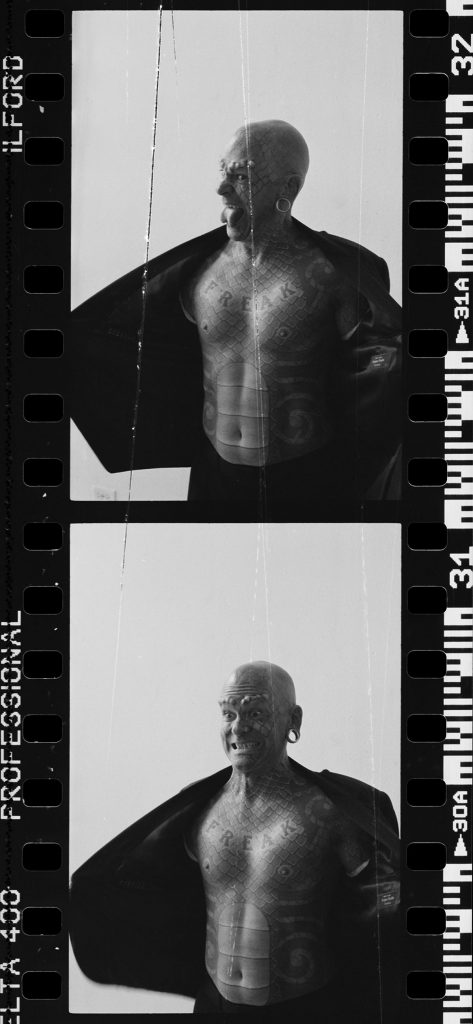
Gustaf: And what would you say are the benefits to that?
Lizardman: The benefits are tactile, they’re sensile. I feel like I’m constantly tongue kissing myself. And I mean, in erotic situations it has an appeal. I’d be lying if I were to say that my wife wasn’t, you know, at least in part, initially drawn to me because she was curious about that. I’ve never heard a bad report on a split tongue, that’s all I can say.
Gustaf: I recently read that the split tongue procedure is forbidden in some states in the US?
Lizardman: There’s various legislation. In some states there’s been specific tongue-splitting legislation introduced. Back in the early 2000s, I was on radio shows constantly. I ended up debating with state senators who were using pictures of me on the senate floor when they were introducing these bills, saying we’ve got to prevent kids from doing this. In the meantime, they’re holding up a picture of a person in their 30s, who did it as an adult, right? And at the time, there were probably less than a thousand of us in the world, you know?
My split tongue was actually done by an oral surgeon who was the designer of the procedure and I was his guinea pig. Some people have taken it upon themselves to do these kinds of procedures and some have become very, very good at it. But they still don’t have licenses, so it’s surgery without a license.
There are situations where I completely short circuit people’s brains, people literally stop walking.
Gustaf: What was the legislation, was it just in regard to children below 18?
Lizardman: No, it was banning it completely, they went after it as a dangerous procedure. The nonsense that they were throwing out! There were saying things like this could “result in death”. Well, so can everything, right? They were like, “you won’t be able to speak”. I was literally on talk radio with one of these guys saying “well, you run the risk of permanently damaging your speech” and I’m like, have you had any problems understanding me for the last 40 minutes that we’ve been talking? Like, what is wrong with you that you don’t understand this is not real? You’ve imagined it.
That was when I was on the most popular Ripley’s episode and myself and people like me were a hot ticket item for ratings in the news. It was a very popular time to do body modification stories, it was probably the peak of my cable TV appearances and politicians figured out that they could use me to attract interest. Every one of these guys who were introducing this legislation was just looking for a camera and they got it by waving my photo around screaming “we’ve got to do something about this”. Most of the time the legislation didn’t get passed through. Sometimes it did, but it didn’t change anything. Nobody cared. It was just a PR stunt.
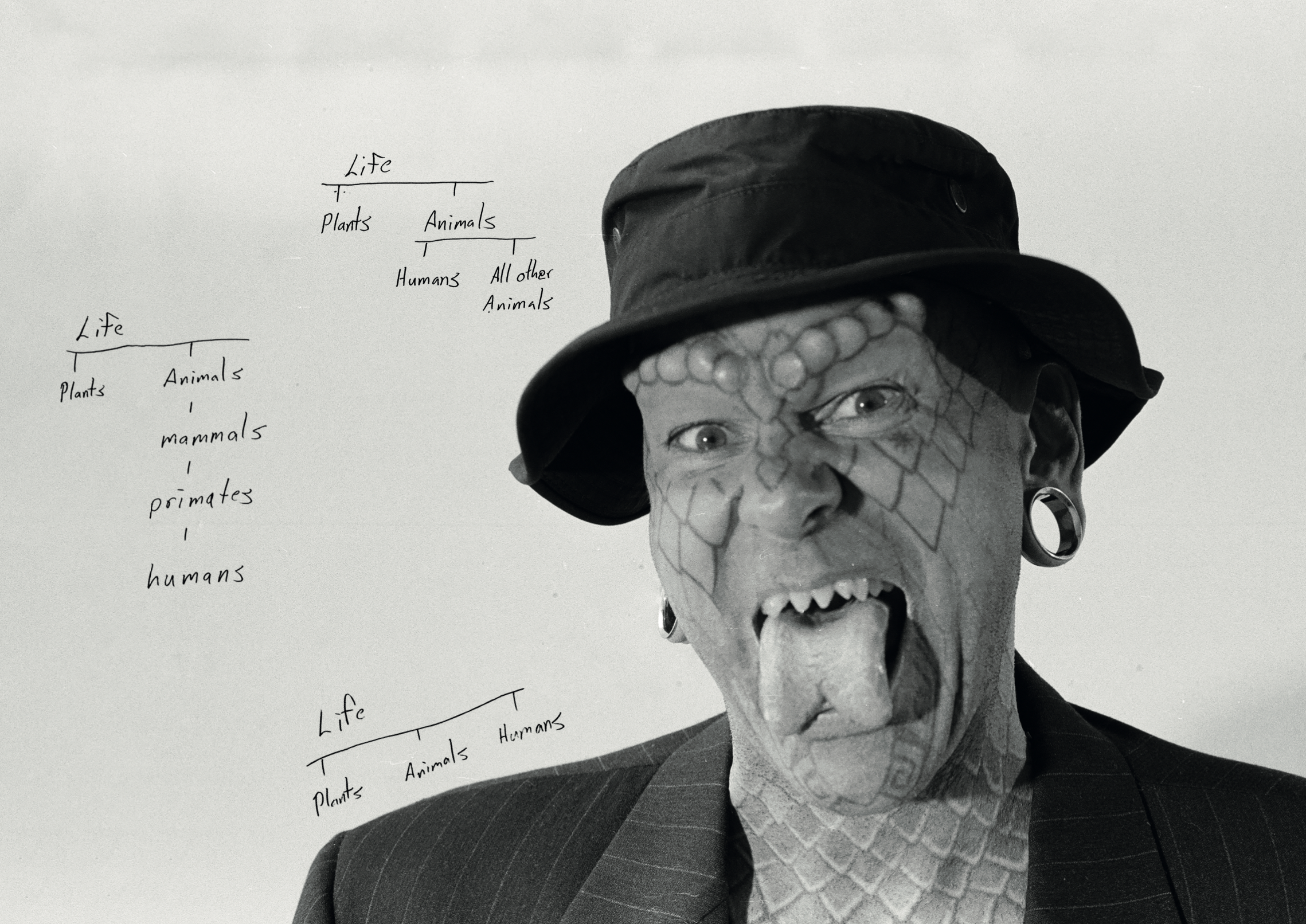
Gustaf: What do you think more generally about who should decide about this kind of thing? Do you think there are any limits, that it should be regulated by law? I’m sure you know about this debate around voluntary mutilations and amputations, things like that.
Lizardman: I’m almost always going to come down pretty hard on the side of the individual. Let them do it. But I’m also not going to be a hardliner because there are situations – I think voluntary amputation is a great example – where I just feel like most human beings with any ounce of empathy immediately scream out “no, don’t let this happen!”, right? But I’ve had some very positive experiences with voluntary amputees. Also, I know people that were for example born without a hand. That’s a good friend, we call him Lefty, not coincidentally. He’s a fantastic bass player in a band that I’m a fan of. I also know a guy who voluntarily amputated his own hand, and if you meet him, he’s boring! He’s not crazy, he’s boring, except he cut off his hand, and when he cut off his hand, that’s when he became boring. That’s when everything was all right for him as he had that level of body dysmorphia. It’s really hard for me to wrap my head around it, but it was good for him to do that.
Gustaf: Let me push a little bit here – would you say that there should at least be some age limit, that you shouldn’t do body modification until you’re 18 or 21? Or would you say that it could just as well be done when you’re that young?
Lizardman: I think that there are basic technical reasons for not wanting to modify a developing body, because you literally do not know what’s coming down the line. This is one of those things where I’m kind of glad that I was a little bit of a late bloomer when I started – technically, legally, however you want to put it, an adult in society. Even further down the road, I’ve always had a one-year waiting limit on new procedures. Even with a fully developed body, I think I have to think about what this is going to mean down the line. I don’t think in terms of removal or surgical repair or changing back, I think of living with this going forward. It’s what I suggest to people who are looking at doing anything like this. I don’t even care if it’s just an ear piercing. It’s your body, it’s who you are. It’s what you are. Life lessons from Uncle Lizardman!
If I stopped behaving human and stopped looking human, would they have to expand the definition to include me?
Gustaf: It seems like one reason you’re doing this is just to make people happy?
Lizardman: That’s kind of where I have landed. What it comes down is, this is the purest thing I can do that doesn’t have a downside.There are other things I could be doing, but they all come with costs. I could have stayed in academia, I could have stayed in grad school, but everything comes with a cost.The costs I’m willing to pay are the ones that come with going out in the street like this, because the reward is something that to me is as pure as it gets. I go out, I make people happy, they’re happy, they give me some money, I continue to make other people happy, and we just keep that rolling. If that works, then great, I’m going to stay on that train.
Gustaf: Surely you get some negative reactions as well?
Lizardman: There’s a spectrum of reactions. There are situations where I completely short circuit people’s brains, people literally stop walking. They just have to stop, like they can’t process me and walk at the same time. I think the real thing that gets under people’s skin, like on a subconscious level, is that I’ve broken the rules, right? I’m not supposed to be happy, I’m not supposed to be successful. What about them? Why did they get a shit job when I can be on TV just for being tattooed? They think I’m getting away with something, but they don’t want to go through the procedures I’ve gone through or, you know, learn to shove swords down their throat. So, I think that’s subconsciously in the back of a lot of people’s heads when they’re being critical. This all feeds back to this very old saying that goes, “I learn more about you from your reaction to my tattoos than you will ever learn about me from my tattoos”. Been up in tattoo shops for probably a century or more.

Gustaf: Envy of your success is clearly one thing, but also, one could speculate, people are subconsciously envious that you’ve dared to do certain things when they haven’t?
Lizardman: Before I was the weird guy who could pull it together and get through the meeting, or get the job, but in my spare time did all this weird stuff. I didn’t want that, right? I don’t want to pass, I want you to see me more like a living cartoon, which matches up with how I feel and behave. I’m usually doing something goofy like sticking a fork up my nose or something. I want you to immediately recognize that I’m not one of you. He’s not in the PTA. He’s not coming to the barbecue. He doesn’t watch sitcoms. I want you to know that I have separated myself. I’m a freak, right? I have “freak” tattooed on my chest. I feel like I’ve earned it.
| Photography | Justin Heron |
| Edit | Kornél Kovács |
